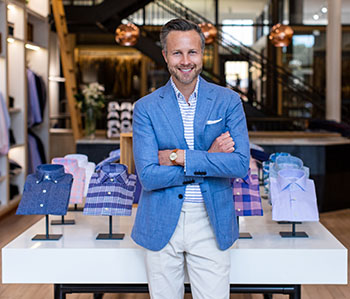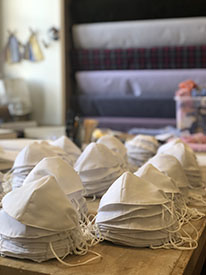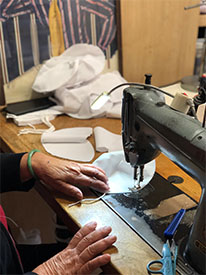Shifting from shirts to masks
Richmond-based menswear company Ledbury has pivoted to produce protective face masks for VCU Health Systems and essential businesses.
Sydney Lake //April 10, 2020//
Shifting from shirts to masks
Richmond-based menswear company Ledbury has pivoted to produce protective face masks for VCU Health Systems and essential businesses.
Sydney Lake //April 10, 2020//
Virginia Business virtually sat down with Paul Trible, CEO of Richmond-based menswear manufacturer Ledbury, which specializes in custom clothing and men’s shirts. This is part of an ongoing series of conversations with Virginians about how their work lives and businesses have changed during the pandemic.
Virginia Business: How did you decide to convert to producing protective masks?
Trible: We have a workshop in Richmond where we make custom shirts by hand. We started about two weeks ago making masks — just sampling them, figuring out patterns and giving them away to people. One of our customers who works at Massey Cancer Center contacted us about their need at VCU Health Systems. We reached out to them and found out that there were people in the community who were helping to produce these masks for VCU Health Center to meet some of their immediate needs as they started ramping up during the crisis.

Luckily we had the expertise and the know-how, and in Richmond we were able to start production along with other businesses in the community, like Shockoe Denim. We then started providing masks to [VCU Health] on a daily basis.
In parallel to that we said, “obviously there’s a bigger need that we can satisfy here in Richmond.” [We then turned] to some larger premium shirt factories throughout the country, saying, “We need some of this unused capacity,” which is obviously affecting factories right now, and pivot from making shirts to making masks. Now we’re producing close to 25,000 masks a week at our production facilities. We’re prioritizing, certainly, the VCU Health System. We want to be able to solve all of that need. But we’re talking not only to health systems, but also to essential services like utilities, banks and other folks who are at the front line of this thing who are going to need masks and see if we can help them in the near term with that need.
VB: How and where are the masks being made?
Trible: There are different types of masks being made. The ones we’re specifically making for the health system is made of a unique fabric blend. The ones we’re making for people [who work for] banks, utilities, food service delivery, are mostly made from 100% cotton that’s been finished with an anti-bacterial.

[We have] dozens of manufacturing facilities. But really we’ve turned to our shirt-making facilities. We have one in Poland and one in Honduras that are making these masks. We’re also making them in Richmond. In terms of capacity, we’re making 250 units a day in Richmond. The majority of the volume that we produce for health systems or businesses are made in [our facilities] abroad.
There’s training and approved patterns around how to make these, and how to make them well. Luckily, the sewing of a custom shirt is a pretty complicated process, so [the people who make them] are very good sewers. It’s something they were able to pick up pretty easily. We were luckily able to source the correct fabrics and we were able to turn them around fairly quickly.
VB: How do you care for the masks?
Trible: They’re reusable. They can be sterilized and be used again and again, which I think is helpful. Like a shirt, it can be washed and dried. They have a filter pocket where you can place a filter to provide some extra protection.

Who is making your masks in Richmond?
Trible: We have three tailors who are usually shortening sleeves. Now they are making masks. Our friends at Shockoe Denim are doing about 700 a day, so [together] we’re getting about 1,000 masks over [to VCU Health] a day.
One of the real blessings in this is we’re able to help a huge need for a huge health system and for other folks who are on the front lines while the rest of us are sheltering in place. At the same time, we’ve been able to employ our people in Richmond who are sewing and also help our production partners who we’ve been working with for 10, 11 years who are facing such a critical time themselves.
How are you balancing this with normal business?
Trible: Our main focus in the near future [is making masks]. Masks are going to be part of our wardrobe. As the country opens back up and people head back to work, [workers] are going to need masks just because that’s going to be part of our wardrobe for the next six months or [the] foreseeable future. I think this is a product now that is going to be part of our lives and our business, but at the same time we’re going to stay focused on shirts since that’s the core of what we do.
Will these be commercially available?
Trible: For us, our business is a direct-to-consumer business, but for right now we’re really trying to take care of the health care system and essential services and other businesses that are going to bring our country back out of this. Companies in need of masks can visit our website or email us.


















